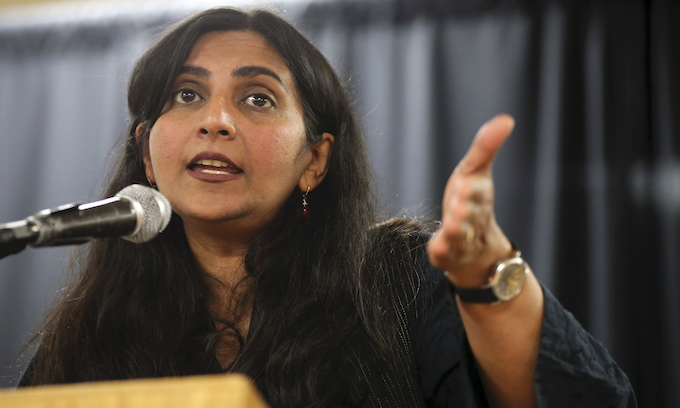The Washington state Supreme Court on Thursday allowed the recall campaign against Seattle City Councilmember Kshama Sawant to move forward, paving the way for signature-gathering and, potentially, an election this year that could oust Sawant from office.
Recall petitioners now have 180 days to collect more than 10,000 signatures from residents of Sawant’s Council District 3. If they collect the signatures, a recall election — an up-or-down vote on Sawant — would be held, likely in August or November.
The recall effort, spearheaded by Seattle resident Ernest Lou, began last summer and has raised more than $294,000 and spent more than $107,000. Sawant’s recall defense campaign has raised more than $309,000 and spent more than $182,000.
In September, a King County Superior Court judge allowed the recall to go forward on four separate charges. Sawant appealed that decision to the state Supreme Court.
Lou’s recall petition charges Sawant with four distinct offenses: She delegated her office’s employment decisions to her political party; she used city resources to promote a “Tax Amazon” ballot initiative; she let demonstrators into City Hall during a nighttime June protest; and she spoke at a protest in front of Mayor Jenny Durkan’s house (Durkan’s address is protected by a state confidentiality program because of her past work as a federal prosecutor).
The Supreme Court, in a unanimous ruling, found the charges sufficient to move forward with the recall.
The court allowed the recall to proceed for the offenses related to the Tax Amazon ballot initiative, the City Hall demonstration and the protest at Durkan’s house, but rejected the charge about delegating her office’s employment decisions.
Sawant, a socialist representing Capitol Hill and the Central District, was elected in 2013 and reelected in 2015 and 2019. Normally, she would not face reelection again until 2023.
Her campaign fighting the recall, the Kshama Solidarity Campaign, said the court “gave a green light to the billionaire-backed, right-wing recall” and announced a rally, this Saturday, in Capitol Hill, to build support for her recall defense.
“Big biz and the right wing are furious about the impact of socialist politics and social movements in Seattle & how we have inspired working people around the country,” the campaign wrote on Twitter. “They are now trying to use the courts & their deep pockets to overturn Councilmember Sawant’s 2019 re-election.”
Sawant’s campaign has been spending money on office space and staff salaries, while the biggest portion of the recall campaign’s spending has gone toward legal and consulting fees.
The court’s role in the recall process is to assume the charges are true and to determine whether they are specific and serious enough to warrant potential removal from office.
The charges, by state law, must represent “misfeasance, malfeasance or violation of the oath of office.”
In October, the court ended an effort to recall Seattle Mayor Jenny Durkan, finding the charge against her — that she allowed police to use tear gas without concern for the health of the community — was “insufficient” to let a recall go forward.
The city of Seattle is covering the legal costs for both Sawant and Durkan in their recall defenses.
Lou, represented by former U.S. Attorney John McKay, argued Sawant’s appeal is more interested in contesting the truth of the charges than their seriousness and “sufficiency.”
He wrote that the charges are all true and “based on an extensive record,” but that it’s up to voters, not the court to decide.
“The charges state how Councilmember Sawant endangered Seattle residents and City employees, violated the Seattle City Code and state laws, and her oath of office,” Lou argued in legal briefs. “The voters have the constitutional right to interpret those facts in our state’s recall process.”
Sawant, represented by labor lawyer Dmitri Iglitzin, argued all four of the charges against her fall short for different reasons.
The charge that she opened City Hall to a crowded nighttime protest despite COVID restrictions fails, Iglitzin wrote, because protests were not prohibited and opening City Hall was within Sawant’s discretion.
The court disagreed.
By opening City Hall, Justice Barbara Madsen wrote for the court, Sawant “arguably obstructed city business and placed people at risk.”
“Councilmember Sawant knew the council had closed city hall to the public in response to the governor’s Stay Home — Stay Healthy order as she voted to permit the council itself to meet remotely,” Madsen wrote.
The recall petitioners, Iglitzin wrote, did not provide any evidence that Sawant led the rally to Durkan’s house, only that she spoke at it.
But, the court ruled, “it is no coincidence that the protestors found themselves in front of Mayor Durkan’s house.”
The court found that Sawant’s actions in the protest did not amount to “criminal harassment” but that they could potentially violate Seattle City Code provisions about disclosing confidential information.
Sawant argued that at the time she used city resources to promote “Tax Amazon” it was simply a policy proposal, not yet a ballot proposition, and so there were no public disclosure requirements.
But the court, again, disagreed.
“As a politician, she is free to sponsor events using her office and to provide food to constituents,” Madsen wrote. “But, by providing picket signs and phone banking for the initiative, her conduct crossed into the territory of promoting a ballot proposition because these are explicit actions taken in support of the ballot proposition.”
Sawant’s move to delegate decision-making on hiring and firing in her office to her Socialist Alternative party is “inherently discretionary,” Iglitzin wrote in legal briefs, and Lou has not presented evidence showing Sawant “intended to violate the law.” He compared it to politicians who sign pledges to support a party platform or not to raise taxes and said it was “simply not what [the law] was designed to protect against.”
On this charge, the court rejected the recall attempt, finding that Sawant “has the right to structure her internal decision-making process as she wishes.”
___
(c)2021 The Seattle Times
Visit The Seattle Times at www.seattletimes.com
Distributed by Tribune Content Agency, LLC.
—-
This content is published through a licensing agreement with Acquire Media using its NewsEdge technology.



















“Big biz and the right wing are furious about the impact of socialist politics and social movements in Seattle & how we have inspired working people around the country…”
Socialism does NOT inspire working people. It inspires elites and leeches.
Democrats only believe in 90% inspration,,,10 % persperation,,,,which is why they eventually deserve to get recalled.
Seattle City Councilmember Kshama Sawant is a socialist / communist who was voted in by communists. Is there something in the water on the west coast and the northeast coast? These idiot elitist voters, are communists!!!! When is the earthquake going to come, so the communist states on the west coast, fall into the ocean???
NOW the same needs to get done with ALL THE OTHER COMMUCRATS in seattle… STARTING WITH the mayor.
Not soon enough, but we can all hope for it to happen.
That’s one reason it is called the left coast. From Mexico to Canada it is one communist block. Communist governors, Seattle has a communist mayor, and of course there is this communist import from India. Bet they don’t want her back.
Even the normally highy conservative San diego area, is turning leftist.
i will probably get slammed over this comment but there is to much estrogen in american
politics.
I won’t slam you.. You are IMO, very correct, saying there’s too many WHAMMEN in politics AND emasculated men.
Even if they do succeed in unseating Sawant, how many other Commies, er um Socialists, will still be on the Seattle City Council? And which party will wind up claiming the seat should she get the boot? Probably another anarchy loving Commie.
You Pacific Northwest people get what you vote for. Wake up before it’s too late!
Which is why removing newsome in CA, won’t really do much, UNLESS THEY ALSO get rid of the rot in the CA legislature..
There is no one to wake up. In Washington state the election is decided before the ballots are even handed out. It has been decades since we have had an actual honest election here.
Joe Biden should be recalled because he is guilty of “misfeasance, malfeasance and violation of the oath of office.”